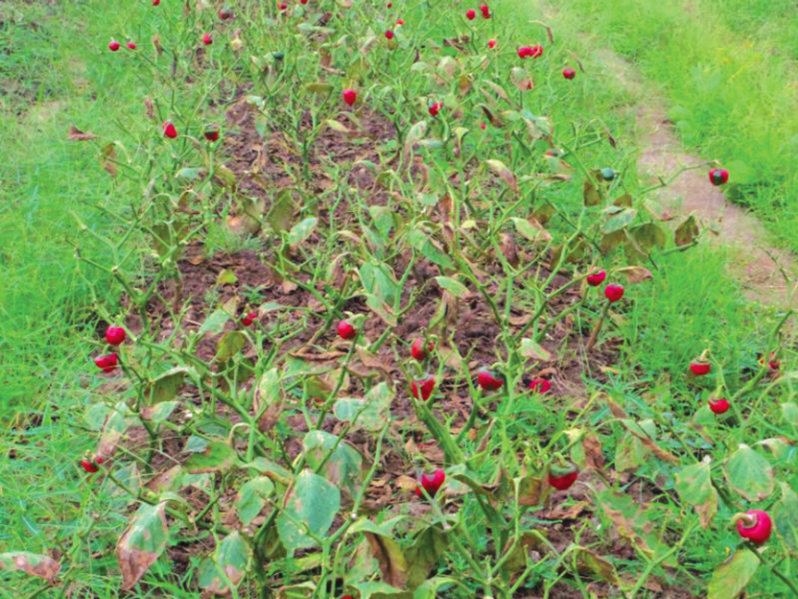
Mites invade sweet pepper farms in Winneba
Mites have invaded sweet pepper farms and destroyed large acres in the Effutu Municipality in the Central Region not long after fall army worms destroyed large acres of farms across the country.
About 100 acres of farmlands in the municipality have been taken over by the dreadful mites, forcing some of the farmers to abandon their farms, while others with the means have also relocated to other farms within the area to replant.
During a visit by the Daily Graphic to the affected farms, it was observed that the insects had forced most farmers out of business. They had no option but to abandon their farms, leaving the destroyed pepper at the mercy of the weather.
Those who employed many workers have had to lay some off in order to sustain their operations.
One of the affected farmers, with about 50 acres of sweet pepper and tomatoes, is Mr Jonathan Addo.
His entire farm located behind the Winneba Senior High School (WINNESEC) has been totally destroyed by the mites. His investment runs into thousands of Ghana cedis.
How it started
Mr Addo said the insects were detected two weeks after he finished planting in May 2017; when he realised that his crops were being destroyed.
According to him, he found it very difficult to get the needed chemical to combat it. He stated: I travelled to Koforidua, Takoradi, Kumasi and even Accra to get the chemical to fight it but to no avail.
He indicated that his inability to get the chemical worsened matters, leading to the total destruction of his entire farm.
He lost his investment worth GH¢250,000, making it very difficult for him to pay his workers.
According to him, he has been compelled to relocate to another place to begin the whole planting process so as to meet the demand of the market.
He has, therefore, called on the government to support farmers fight the insects, since they had affected vegetable farms in other regions as well, adding that: The government must assist us to fight the mites just like it helped farmers to control the fall army worms’.
Another farmer, Mr Isaac Tompoli, could not hide his frustration as the mites had destroyed his only source of livelihood.
He pointed out that farming was his major occupation, hence the destruction of his farm by the mites would make it very difficult for him to cater for his family.
He added his voice to the call for the government to, as a matter of urgency, come and support them to offset the huge loss incurred.

Director of Agriculture
The Effutu Municipal Director of the Department of Agriculture, Mr Hope Kumah, said the municipality was well noted for vegetable production, with some farmers engaged in the business for at least eight years.
He pointed out that this year’s mite infestation was severe as compared to previous years because the weather was conducive for them, leading to the destruction of many farms in the area.
He added that the unavailability of miticide, particularly mektin, in the country made it very difficult for them to control the mites.
He explained that his outfit would continue to offer technical advice to the farmers to protect their farms from further destruction by insects.
Mr Kumah said samples of the plants had been taken to the University of Cape Coast (UCC) for investigation to find out more about the infestation.
Facts about mites
Mites are hard to see with the naked eye but their presence can be monitored by sticky cards or just shaking the plant over a piece of white paper.
Those tiny or red specks are sucking insects that can do a lot of damage to the health of trees, edibles and some herbs. There are many types of mites, each of which has preferred plant hosts.
Mites can be found on landscape, ornamental or house plants. These versatile little insects do not only reduce plant vigour but can also transmit some dangerous viruses and diseases. Plant mites feed by piercing plant cells and feeding on the moisture inside, leaving necrotic or yellowish spots.

Spider mite
One type of mite which is easy to recognise is the spider mite. This insect produces fine webbing that lightly net leaf tips and stems. Spider mites attack a wide range of plants from indoor to outdoor specimens.
Mites are actually arachnids and more closely related to spiders. They have eight legs and a two-segmented body. Mites on garden plants are difficult to diagnose due to their tiny size. Mites on house plants may be easier to spot as these are usually spider mites and they are prolific breeders whose population can reach a damaging level very quickly.
Mite control
Dry and hot conditions enhance mite activity and it is important to keep weeds away from ornamental plants and remove infested species out of the farm to prevent spreading the mites.
Mites in plants can be treated with a broad spray of miticide and it is best to try to identify your pest mite as there are beneficial predatory mites that will eat the damaging arachnids.
